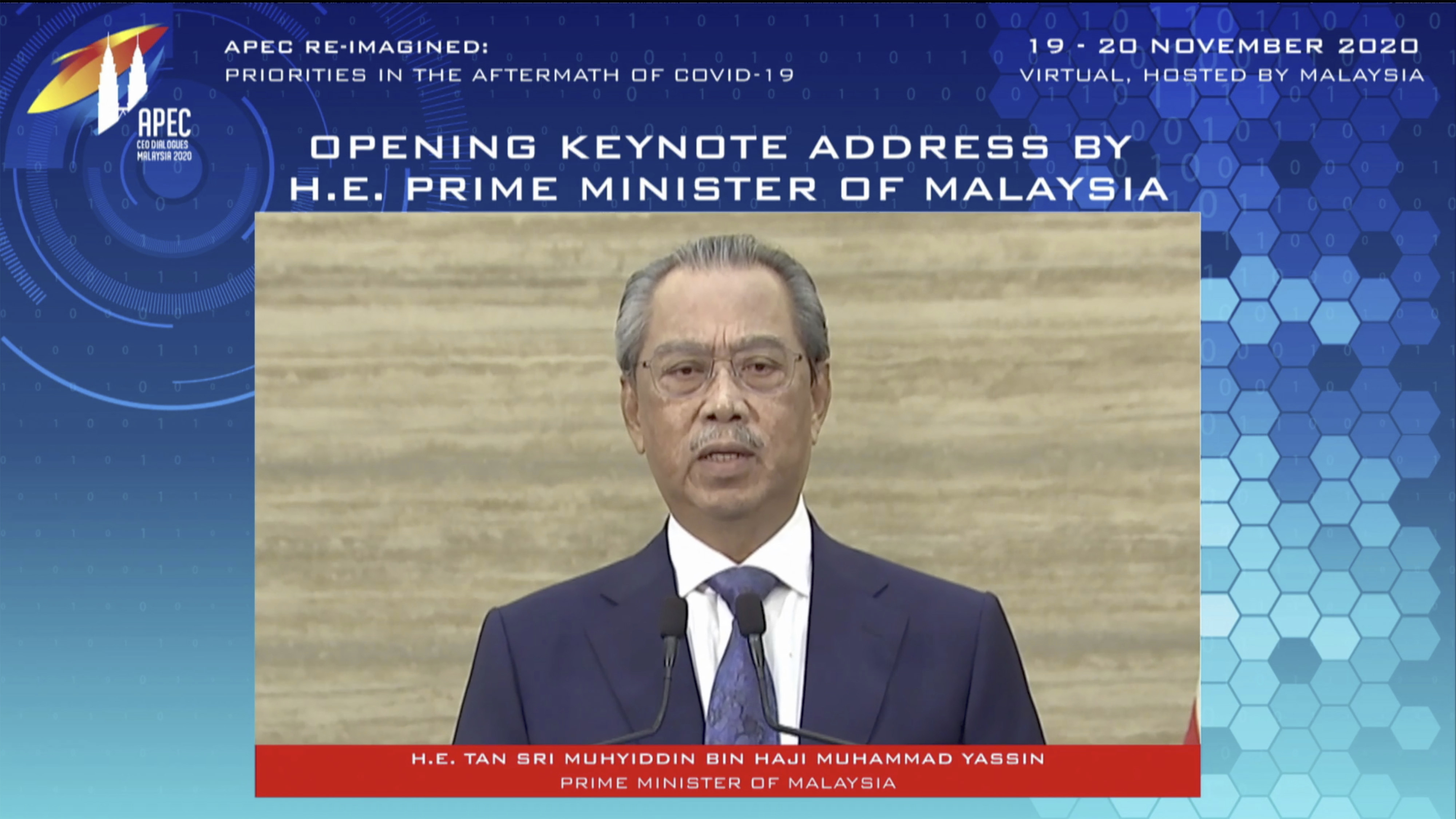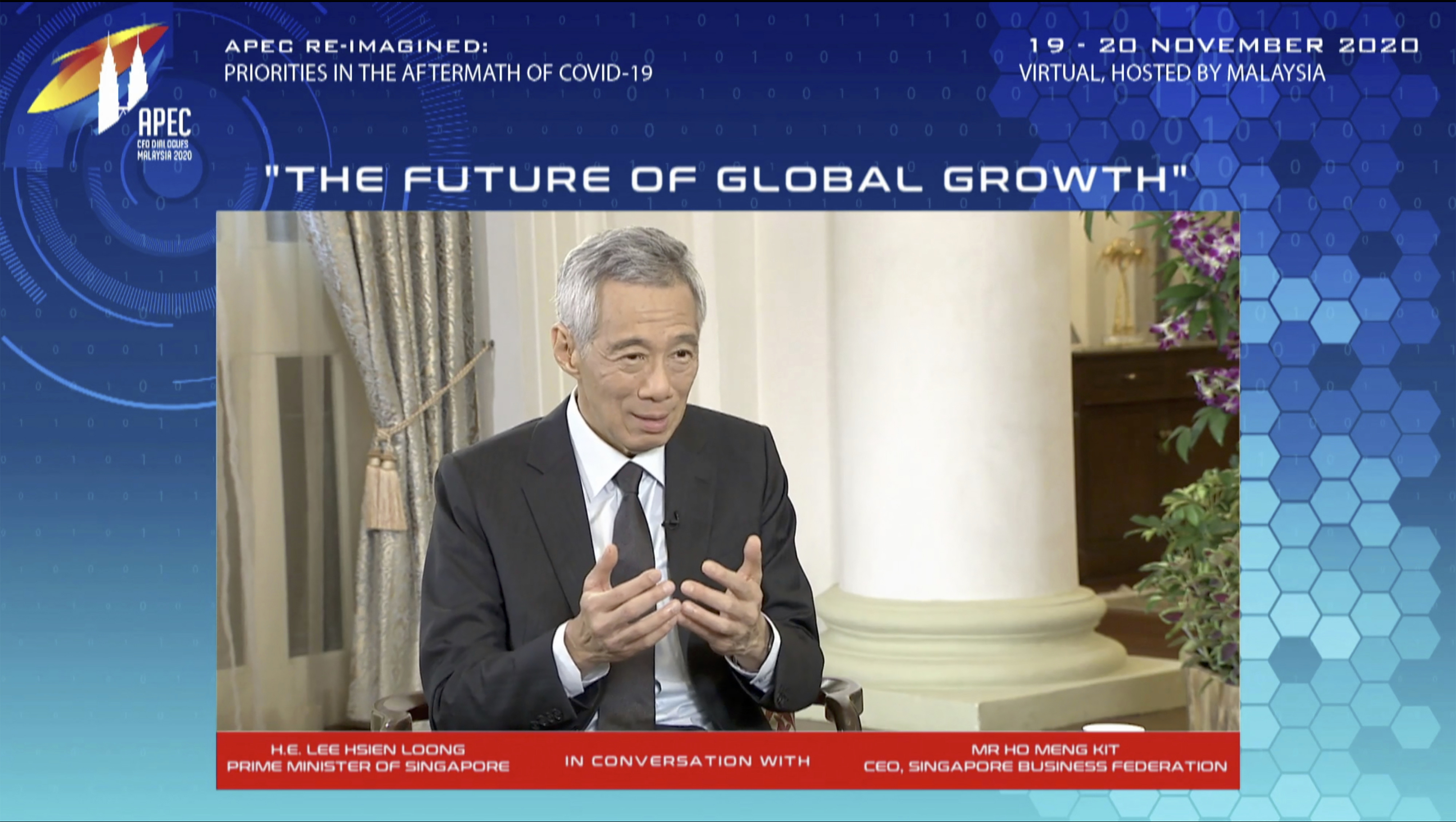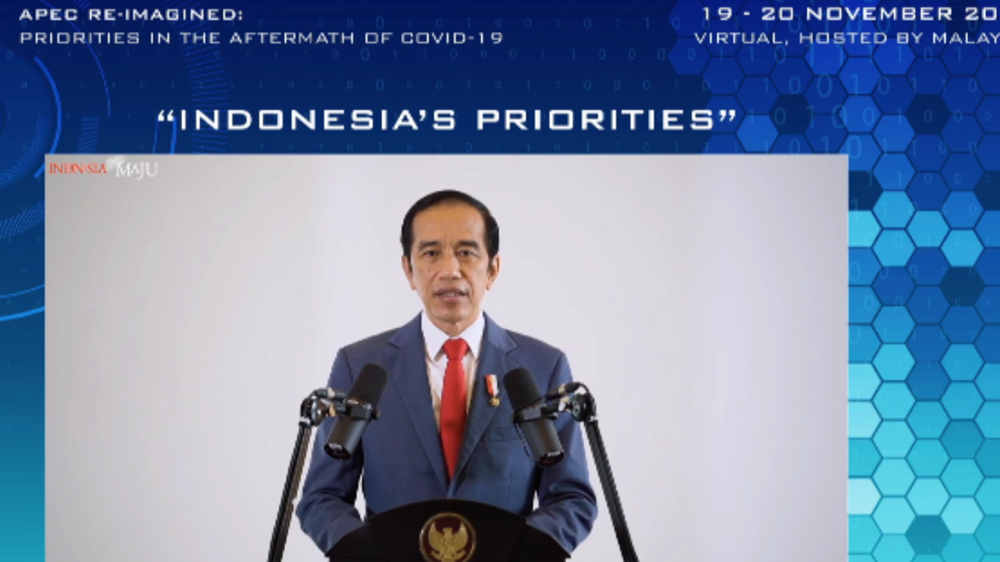
Malaysia's Prime Minister Muhyiddin Yassin speaks at the 2020 Asia-Pacific Economic Cooperation CEO Dialogue via video link, in Kuala Lumpur, Malaysia, November 19, 2020. /AP
Malaysia's Prime Minister Muhyiddin Yassin speaks at the 2020 Asia-Pacific Economic Cooperation CEO Dialogue via video link, in Kuala Lumpur, Malaysia, November 19, 2020. /AP
Foreign leaders joined the 2020 Asia-Pacific Economic Cooperation (APEC) CEO Dialogues 2020 on Thursday, laying out their commitment to promoting the group's core goal of free and open trade and investment in the wake of the COVID-19 pandemic.
"Three priorities are free and open trade and investment, regional economic integration, as well as economic and technical cooperation," Malaysian Prime Minister Muhyiddin Yassin said in his opening keynote speech at the beginning of the event.
APEC economies comprise approximately 60 percent of the global GDP, half of the world's global trade and 40 percent of the world's population. Under the theme "APEC Re-Imagined: Priorities in the Aftermath of COVID-19," Muhyuddin stressed that countries and regional stakeholders must cooperate and reaffirmed the commitment to a multilateral trading system during the coronavirus crisis.
Hosted by the APEC Business Advisory Council (ABAC) - Malaysia, this meeting is the first time economic leaders from APEC's 21 member economies have met virtually. While this was done due to the pandemic, Dato' Rohana Mahmood, chair of ABAC 2020, pointed out that online meetings can cut the carbon emissions associated with international conferences like APEC.
"This year has been more disruptive, difficult, uncertain and challenging than most people could have imagined. Global trade and investment can lead to economic recovery and resilience to future crises," said Dato' Rohana Mahmood.
Myhyuddin also stressed the importance of boosting the digital economy as countries are fighting their way out of the economic downturn and trying to balance their health priorities with economic development. Technological innovation can be the engine of the economic development, creating job opportunities, and enhancing regional recovery.
Towards the end of his keynote speech, Muhyiddin also stressed the significance of achieving inclusive economic growth which assures no one is left behind, especially women and youths. "The economy will grow significantly if the barrier is removed or minimized for women," he said
Echoing the theme of the APEC CEO Dialogues, "APEC Re-imagined," the prime minister also urged APEC leaders, global CEOs and visionary entrepreneurs to put more emphasis on youth development, as they "embody our imagination about the future of the world."

Singapore's Prime Minister Lee Hsein Loong speaks at the 2020 Asia-Pacific Economic Cooperation CEO Dialogue via video link, in Singapore, November 19, 2020. /AP
Singapore's Prime Minister Lee Hsein Loong speaks at the 2020 Asia-Pacific Economic Cooperation CEO Dialogue via video link, in Singapore, November 19, 2020. /AP
Also during the dialogue, Singapore Prime Minister Lee Hsien Loong had a panel discussion themed "The Future of Global Growth" with CEO of Singapore Business Federation, Ho Meng Kit.
During their conversation, Prime Minister Lee pointed out the challenges of a global pandemic that confronted with the world, while outlining the importance of sticking to the basic principles of multilateralism and trusting the international establishments.
In terms of medical arrangement, Lee said that World Health Organization is coordinating the global cooperations in regard with the vaccine and the rational distribution. He said that Singapore will prioritize the most vulnerable people and the first-responders, and working with international organizations and entities to sort out a more reasonable distribution.
Lee spoke highly about the signing of the Regional Comprehensive Economic Partnership (RCEP) agreement of 15 countries, marks the launch of the world's biggest free trade bloc.
"RCEP is a big step forward." Lee said while talking about the recent highlights of the international cooperation efforts. "We are still looking forward Indian to joining it, which fits India's domestic considerations and also the economic considerations in the long run."

Indonesian president Joko Widodo speaks at the 2020 Asia-Pacific Economic Cooperation CEO Dialogue via video link, in Singapore, November 19, 2020. /@APEC_Dialogues
Indonesian president Joko Widodo speaks at the 2020 Asia-Pacific Economic Cooperation CEO Dialogue via video link, in Singapore, November 19, 2020. /@APEC_Dialogues
Indonesian President Joko Widodo spoke about the country's job creation law at the APEC CEO Dialogues 2020 on Thursday. Jokowi said that 2020 was a difficult year for the world.
Despite the challenges in solving unexpected problems caused by COVID-19, he said: "I believe opportunities and chances are still widely available for us."
The president said that Indonesia has used the crisis to carry out structural reforms "in order to move quickly through these difficult times so that we are more than ready to open our doors for businessmen and investors, and of course through innovative ways."
By introducing the job creation law that consolidated 79 bills into one, Jokowi said: "Our main purpose is to create a quality business and investment environment for all businesses, including MSMEs and foreign investors. Overlapping regulations and complex procedures are trimmed, the red tape of a long bureaucratic process for licensing is eliminated, as well as illegal levies and corruption that have hindered business and environment will also be eradicated."

